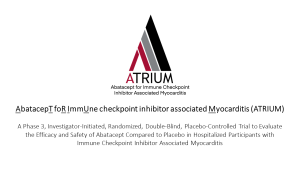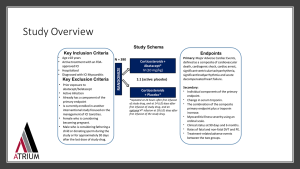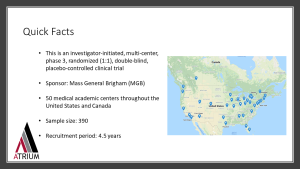Current Research Projects
ATRIUM TRIAL
Immune checkpoint inhibitor myocarditis is an uncommon toxicity associated with the use of immune checkpoint inhibitors in cancer but is associated with a rate of major adverse cardiac events that is greater than 50%. There are case reports and robust basic data to support the hypothesis that abatacept may be beneficial among patients with immune checkpoint inhibitor myocarditis. However, there are no rigorous data. In the ATRIUM trial (ATRIUM Brief Overview Image), 390 patients with immune checkpoint myocarditis will be randomized to usual care or usual care plus abatacept. The study design is a double blind placebo controlled trial (Clinicaltrials.gov). The ATRIUM study is an investigator-initiated study and is actively recruiting. The sponsor is Massachusetts General Hospital. In the ATRIUM trial, patients hospitalized with immune checkpoint associated myocarditis will be randomized to abatacept (10 mg/kg) or placebo administered after randomization, again at not greater than 24 hours, at 14 days and there is an optional 4th dose at 28 days (ATRIUM Image 2). Study participants are followed for 6 months for the development of major adverse cardiac events. The investigators plan to have the ATRIUM trial open at 50 sites in the United States and Canada (ATRIUM Image 3).
If your center is interested in hearing more about the ATRIUM study, please contact the ATRIUM study team at atrium@mgh.harvard.edu or one of the co-principal investigators: Tom Neilan - tneilan@mgh.harvard.edu or Paul Ridker pridker@mgh.bwh.harvard.edu
Notice of Special Interest (NOSI): Improving Outcomes in Cancer Treatment-Related Cardiotoxicity
Read MoreGlobal Cardio-Oncology Registry G-COR
- G-COR is the first Global Cardio-Oncology Registry, designed with the proposed participation of 124 centers from 24 countries that provided site demographics with the intention to participate in this Registry.
- Data is entered into a deidentified database using a RedCap Cloud platform, hosted by the Cleveland Clinic. The governing committees are integrated by cardio-oncology practitioners and leaders from diverse backgrounds.
- It is a prospective cohort observational study, that will evaluate clinical, imaging, biomarkers and socioeconomic variables associated to Cancer Treatment Related Cardiovascular Disease (CTRCVD).
- It evaluates cardiovascular and cancer phenotypes, CV and cancer medications, functional status and exercise habits in a diverse population of patients from both academic and community hospitals in different parts of the world.
- It involves three pillars: breast cancer, hematological malignancies, and patients treated with immune checkpoint inhibitors (ICIs)
- A pilot phase with US centers with breast cancer patients will test all procedures in place, centers collaborations, activation and ability to enroll patients; it has successfully started. 24 centers were invited and 14 have already completed all the regulatory steps, have been activated and started enrolling patients, as per April 2023.
- The Global phase is projected to be launched in late 2023 with active international patients' enrollment projected for late 2023, early 2024.
- Leaders in Cardio Oncology from North America, Latin America, Europe, Asia and Australia are part of the G-COR roster, Scientific Committee, and topics Committees. It includes leaders from ICOS, ACC, AHA, ESC among other professional societies.
- If you are interested in learning about G-COR and inquiring about participation, please contact G-COR PI: Diego Sadler MD FACC. Email: sadlerd@ccf.org. We are open to include new centers that treat cardio oncology patients, and we are particularly interested in working with centers from underrepresented areas.




